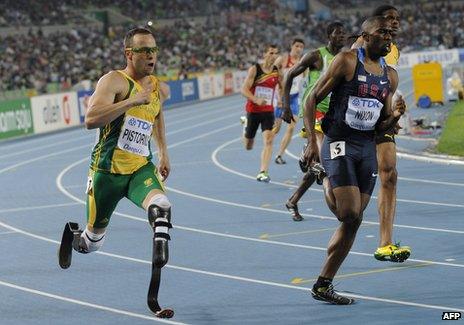What does an Oscar Pistorius-style blade feel like?
- Published
WATCH: Stuart Hughes tries on the blade for the first time and finds out how it was made
BBC producer Stuart Hughes lost the lower part of his right leg in Iraq. On Tuesday he will run part of the Olympic torch relay wearing his carbon fibre blade prosthesis.
"But Daddy, why do you need a torch in the daytime?"
The reaction of my five-year-old son, Billy, to the news that I'd be carrying the Olympic flame just days before the start of London 2012 is one of bewilderment rather than excitement.
To him, a torch is something you keep under the stairs in case of a power cut, not a symbol of the fire stolen by Prometheus and given to mankind.
As the torch has snaked across the UK on its way towards London, Billy's sense of anticipation has increased - as has mine.
He now proudly tells his schoolmates that his father is taking part in the Olympics - and I haven't the heart to tell him I won't be lining up alongside Mo Farah or Mark Cavendish.
When I lost my leg below the knee in Iraq, I couldn't imagine ever being able to walk again properly, let alone run.
But once I began my rehabilitation, I realised how much prosthetics have advanced since World War II, when soldiers returning from the battlefield were fitted with crude, heavy artificial limbs.
In 2004, I travelled to Athens to cover the Olympic and Paralympic Games for BBC News.
There I met American amputee sprinter Marlon Shirley. Shirley won three medals in Athens, including the 100m gold in his class with a time of 11.08 seconds. He later went on to break the 11-second barrier.
As soon as I returned home, I asked my prosthetist to make me a leg just like Shirley's. Within a few months I was able to complete a 10km race, and longer distances were to follow.
As the countdown to the Games has progressed, I've been working with the British prosthetics company Blatchford to design a hi-tech prototype leg to wear for the torch relay.
The process has made me appreciate what an amazing machine the human body is.
An Olympic athlete's leg shifts gear effortlessly from walking to jogging to a sprint. Trying to mimic those motions mechanically is a complicated feat of engineering (if you'll pardon the pun).

Oscar Pistorius will be the first double amputee runner at the Olympic Games
The key to finding a solution has been through what's known as biomimetics - solving design problems by studying what occurs in nature and trying to copy it.
A humble strip of fabric fastening is an example of biomimetics in action. In the 1940s, the Swiss engineer George de Mestral came up with the idea for the product after studying why plant burrs stuck so tenaciously to the fur of his pet dog.
For the Blatchford team, the biggest challenge has been to create a foot that rolls smoothly from heel to toe without jarring or bouncing uncontrollably.
Over the past six months, their design has gone from a hastily drawn pencil sketch to a sleek, shining sports prosthesis made from thin layers of carbon fibre with titanium components.
First developed by the aircraft industry in the 1960s, carbon fibre absorbs the energy I put into it when my artificial heel hits the ground and then releases it like a spring milliseconds later, propelling me forward.
I tried the latest prototype on for size a fortnight ago and it leapt into life like a high performance sports car - although the person behind the wheel was more Sunday driver than Lewis Hamilton.
Where the early models felt dead and sluggish, this one seems almost like an extension of my body, allowing me to jog with ease along the corridors of Charing Cross Hospital in London.
No leg constructed from metal and finely spun carbon thread can yet match the complexity and perfection of a limb made from muscle, skin and bone. My prosthesis, however, is trying its best to catch up with hundreds of thousands of years of human evolution.
The leg has now been given a Formula One makeover, ready for the big day. It has been emblazoned with a Union Flag motif painted by the same company that's responsible for spraying the shells of Lotus cars.
At 40, I'm a little over the hill now to compete alongside Oscar Pistorius, the 25-year-old South African double amputee sprinter nicknamed The Blade Runner.
In terms of eye-catching artificial legs, though, I can definitely give him a run for his money.